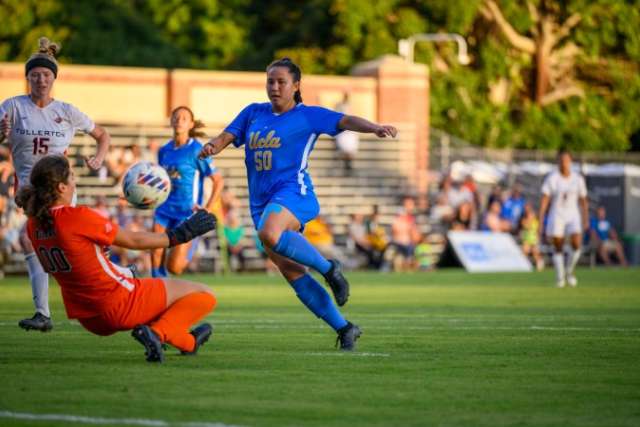Women athletes are more prone than men to suffer debilitating knee injuries, a fact that has cast a long shadow over the Women’s World Cup as some of the sport’s biggest stars are forced to sit out this year’s games.
“This is a hot topic right now because of the high-level players on the U.S. women’s and other soccer teams who are injured going into these games, and it’s shining a bright light on an old problem,” said orthopaedic surgeon David McAllister, MD, chief of the UCLA Health Sports Medicine Service and head team physician for UCLA Athletics.
According to a recent article in the Washington Post, nearly 90 players from eight of the world’s highest-ranked women’s soccer leagues have, since 2021, torn their anterior cruciate ligaments (ACLs), a crucial ligament that supports the knee. Four of the best U.S. players are not playing in the World Cup this year due to ACL injuries.
Why women athletes suffer ACL injuries at a higher rate than men — females are two-to-10 times more likely than male athletes to tear their ACL — has been a topic of debate for years. “That’s the million-dollar question,” Dr. McAllister said.
The abrupt changes in direction, cutting, pivoting and decelerating common in sports such as soccer, basketball, lacrosse and football are key contributing factors to ACL injuries, but why women are more at risk is not clear.
“We recently completed a study in which we looked at ACL injuries among college athletes in the PAC-12 Conference over the last six years. ACL injury rates for American football were high, but women’s soccer had the highest incidence of ACL injury,” Dr. McAllister said.
Finding a solution to curb the high number of injuries
Male athletes also experience ACL injuries, but at nowhere close to the rate of their female counterparts.
“We've seen an explosion of ACL injuries in young women, all the way from 10 years of age up to their teens,” Kristofer Jones, MD, a UCLA Health orthopaedic surgeon and team physician for UCLA Athletics and the Los Angeles Lakers, told the PBS Newshour during a recent broadcast about ACL injuries among women athletes. “It's not uncommon for some of these girls to come in from the high school level to our collegiate team at UCLA and already have had an ACL reconstruction.”
There’s much speculation as to why women players are more at risk, but no definitive answers, Dr. McAllister said.
“This topic has been studied over the past 20 to 30 years, and some studies suggest it has to do with the difference in anatomical features between men and women. Others have said it has to do with hormonal differences in men and women,” Dr. McAllister said. “Some believe it has to do with the difference in how they train. There are all these different theories but no concrete evidence.”
Dr. McAllister explained that solving the knee-injury issue among women has been a complex investigation with many theoretical solutions, but none have been put to the test.
At one time, sports medicine specialists thought that putting a brace on the knees would help, but it was found to be both impractical and ineffective.
“One thing being talked about now is if an implant can be developed that would prevent these athletes from having a recurrent injury,” Dr. McAllister said.
Dr. McAllister is working with a colleague in UCLA’s Samueli School of Engineering to investigate creation of such a device. The aim would be to identify high-risk athletes, such as those who have suffered an ACL injury and are undergoing an ACL reconstruction, and implant a small prosthetic device that would restrict the motion in the knee that causes the injury but not slow down the individual.
“It’s a whole different way of thinking about the problem,” Dr. McAllister said.
He notes there are approximately 400,000 ACL surgeries each year — for both men and women — mostly suffered by young athletes, and a young person who suffers an ACL tear is at greater risk of developing arthritis in the knee at a young age.
By finding a solution to the problem, “we’re trying to put ourselves out of business,” Dr. McAllister said.





